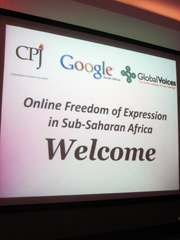Frank Nyakairu has seen it all. A veteran war reporter, he has covered the horrors of northern Uganda and Somalia, among others places. And throughout this time of rich but often appalling experiences, he has also seen the auspicious–and sometimes terrifying–impact the Internet has had on East African reporters.
Nyakairu spoke at a recent workshop held in Johannesburg, South Africa, co-organized by Global Voices, Google Africa, and CPJ. Attendees at the conference comprised some of the most active African bloggers and online reporters on the continent who came to learn how to sharpen their online reporting skills while avoiding the censors.
Reporting since 1999, Nyakairu has seen how the Internet has improved his ability to transmit stories even when based in the most precarious rural locations. And, as the Internet seems to gain exponential popularity in the region, it has become a tool for Nyakairu to crosscheck his writing with fellow online reporters. For a long time, he said, Internet use for journalists in East Africa was open, free territory.
When he was reporting on the war in northern Uganda in 2001 for the leading independent daily Monitor, government authorities shuttered the newspaper for a week. But the government did not bother closing down the paper’s website. “At the time only 32,000 had access to the Internet in Uganda, who cared about the influence of websites at that time?” Nyakairu told me. But this decade has launched a new precedent in communications for East Africans and the entire continent. Now 120 million Africans are on the Internet, according to Internet World Stats.
Since 2001, governments in East Africa have changed their attitudes toward the Web, especially in relation to the social movements in Tunisia and Egypt that made extensive use of social media tools to foment political change.
“WikiLeaks touched every single government and no one is in control,” Nyakairu told me during a break in the conference. “Imagine if similar, regional sites like WikiLeaks enter the playing field? Governments around here won’t like that.”
In fact, regional East African versions of WikiLeaks are already here. Jamii Forums, a Tanzanian Swahili-language website acts as platform for the public to publish material anonymously. The site is popular, with around 32,000 visitors per day, the online editor of Jamii Forums, Mbaraka Islam, told me. The government has noted the site’s influence and is wary. In April, at a party congress held by the ruling Chama cha Mapinduzi Party (Party of the Revolution), the vice-chairman singled out Jamii Forums as a “dangerous critic” and accused the site of actively trying to undermine the government. Since then, Islam told me, suspected government supporters have inundated the site with anonymous postings that criticize the forum and support the government in a “cyber sabotage” effort–a tactic also used by the government of Sudan. “Trust me, we are going to see more and more government resources being used to suppress the power of the Internet,” Nyakairu said.
U.N. Special Rapporteur Frank La Rue reached similar foreboding conclusions at a U.N. Human Rights Council meeting in Geneva earlier this month. “Governments are using increasingly sophisticated technologies to block content, and to monitor and identify activists and critics,” he said at the meeting.
The reactions of governments across East Africa are indicative of La Rue’s warnings. Since last year, the region has had two separate cases of online journalists facing serious legal charges for critical online opinion pieces.
The online editor of Net Press in Burundi, Jean-Claude Kavumbagu, faced treason charges–a lifetime prison sentence for an unbylined opinion piece in July 2010 and spent 10 months in prison before the charges were finally dropped. In neighboring Uganda, authorities raided the office of The Uganda Record and charged its online editor, Timothy Kalyegira, with sedition for a critical online opinion piece. When Kalyegira attempted to retrieve his passport from the police so that he could attend this workshop in South Africa, they detained him overnight and reinstituted the criminal libel charges.
Ethiopia continues to use sophisticated Internet filtering equipment to block websites, including CPJ’s, since the state-owned telecommunications company has monopoly control over Internet access and mobile lines. Even though there are four Internet service providers in Rwanda, the government keeps a close, cozy relationship with them allowing them to censor independent news sites such as Umusingi and occasionally Umuvugizi.
The Internet has proven to be a useful tool for reporters and, unfortunately, the censors. “I remember when I got in trouble with the government back in 2001 in Uganda, I almost feared my own shadow,” Nyakairu recalled. Security agents had to go to great lengths to locate his home and phone number, he said. “Now so many security personnel are jobless, due to social media. This is one danger reporters face: Social media has made intelligence gathering very, very easy.”
During the Google conference, CPJ Internet Advocacy Coordinator Danny O’Brien spoke along with international advocacy organization Tactical Tech‘s Bobby Soriano about a number of software programs that can easily be used to snoop on the public. There are free, downloadable applications, for instance, that allows the user to infiltrate Facebook pages or a WiFi connection.
The Internet can clearly be a reporter’s best friend–and its worst enemy. “It’s like a stick, you can use it to walk or to use it to beat someone,” Nyakairu said.
After the two-day conference, my mind was spinning with some of the threats and challenges online reporters either currently or will soon face in East Africa. Fortunately, O’Brien and Soriano also showed attendants some simple, practical online tools that we can all use to safeguard our identity and work online securely. I suggest everyone keep reading O’Brien’s useful blogs on our Internet Channel to stay safe.
